Legal Analysis: Discrimination Against Learning Disabilities in the UK
VerifiedAdded on 2022/12/14
|9
|2251
|258
Report
AI Summary
This report provides an in-depth analysis of the legal framework surrounding discrimination against individuals with learning disabilities in the United Kingdom. It begins with an introduction to learning disabilities, defining the condition and highlighting the discrimination faced by adults in various contexts, including employment, education, and access to services. The report then delves into relevant legislation, focusing on the Equality Act 2010 and the Mental Capacity Act, explaining their provisions and how they protect the rights of disabled individuals. It discusses the concept of reasonable adjustments and the employer's responsibilities under the Equality Act. Furthermore, the report examines key case laws, such as Mallon v. Aecom Ltd and Royal Bank of Scotland Plc v. AB, to illustrate how these laws are applied in practice. The conclusion summarizes the effectiveness of the legal protections and suggests areas for improvement to ensure equal opportunities and prevent discrimination against people with learning disabilities. The report draws on a variety of academic sources and online resources to support its findings.
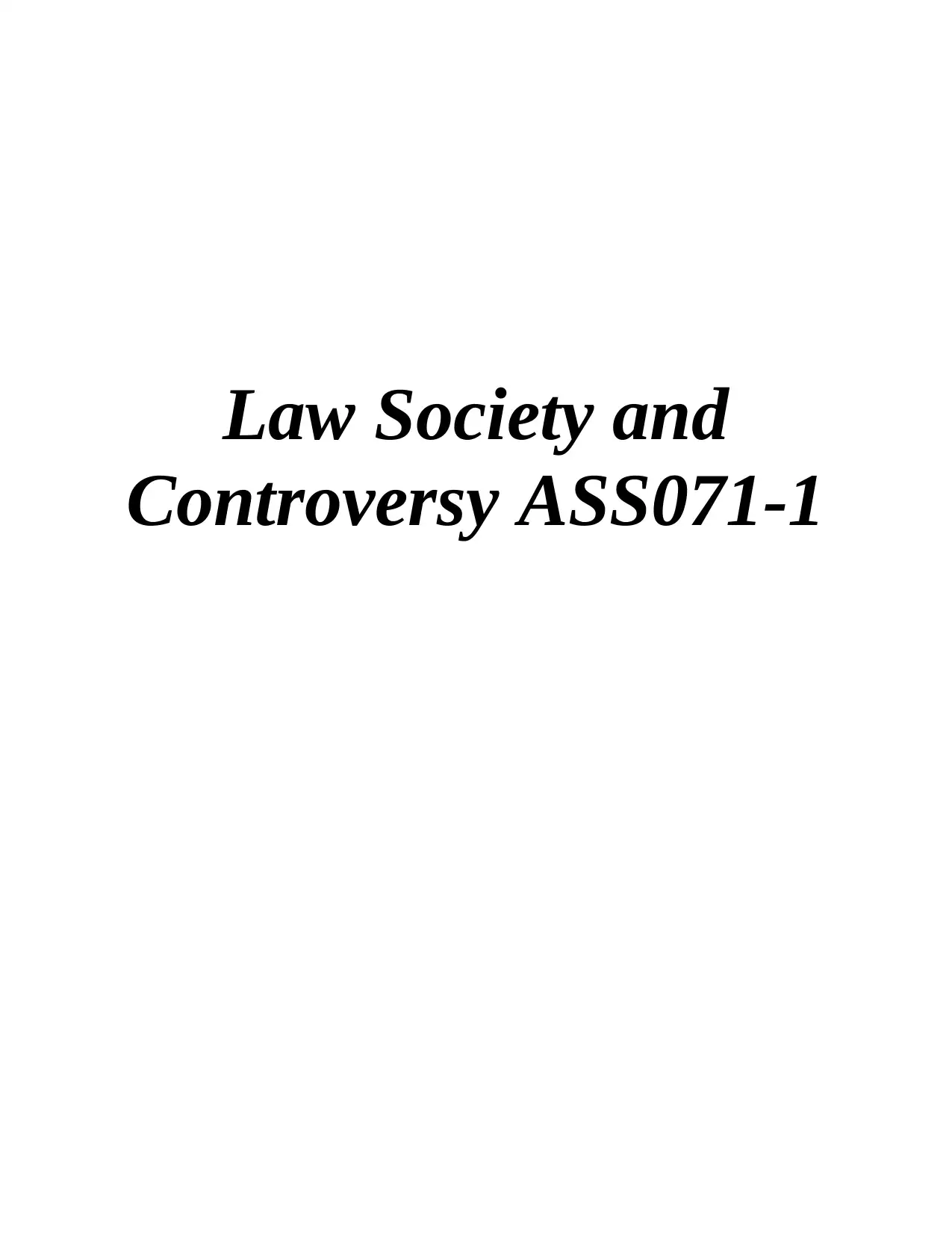
Law Society and
Controversy ASS071-1
Controversy ASS071-1
Paraphrase This Document
Need a fresh take? Get an instant paraphrase of this document with our AI Paraphraser
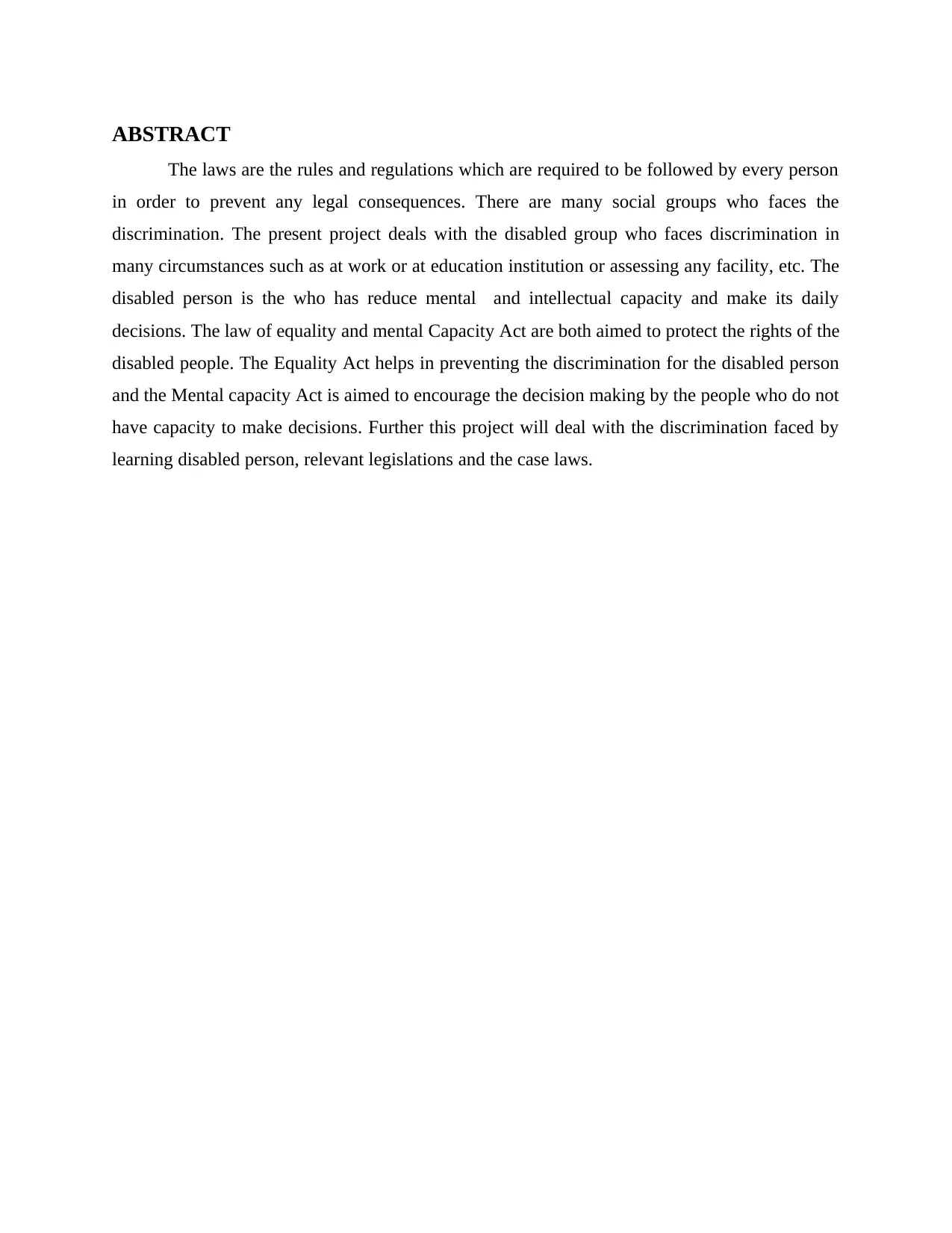
ABSTRACT
The laws are the rules and regulations which are required to be followed by every person
in order to prevent any legal consequences. There are many social groups who faces the
discrimination. The present project deals with the disabled group who faces discrimination in
many circumstances such as at work or at education institution or assessing any facility, etc. The
disabled person is the who has reduce mental and intellectual capacity and make its daily
decisions. The law of equality and mental Capacity Act are both aimed to protect the rights of the
disabled people. The Equality Act helps in preventing the discrimination for the disabled person
and the Mental capacity Act is aimed to encourage the decision making by the people who do not
have capacity to make decisions. Further this project will deal with the discrimination faced by
learning disabled person, relevant legislations and the case laws.
The laws are the rules and regulations which are required to be followed by every person
in order to prevent any legal consequences. There are many social groups who faces the
discrimination. The present project deals with the disabled group who faces discrimination in
many circumstances such as at work or at education institution or assessing any facility, etc. The
disabled person is the who has reduce mental and intellectual capacity and make its daily
decisions. The law of equality and mental Capacity Act are both aimed to protect the rights of the
disabled people. The Equality Act helps in preventing the discrimination for the disabled person
and the Mental capacity Act is aimed to encourage the decision making by the people who do not
have capacity to make decisions. Further this project will deal with the discrimination faced by
learning disabled person, relevant legislations and the case laws.
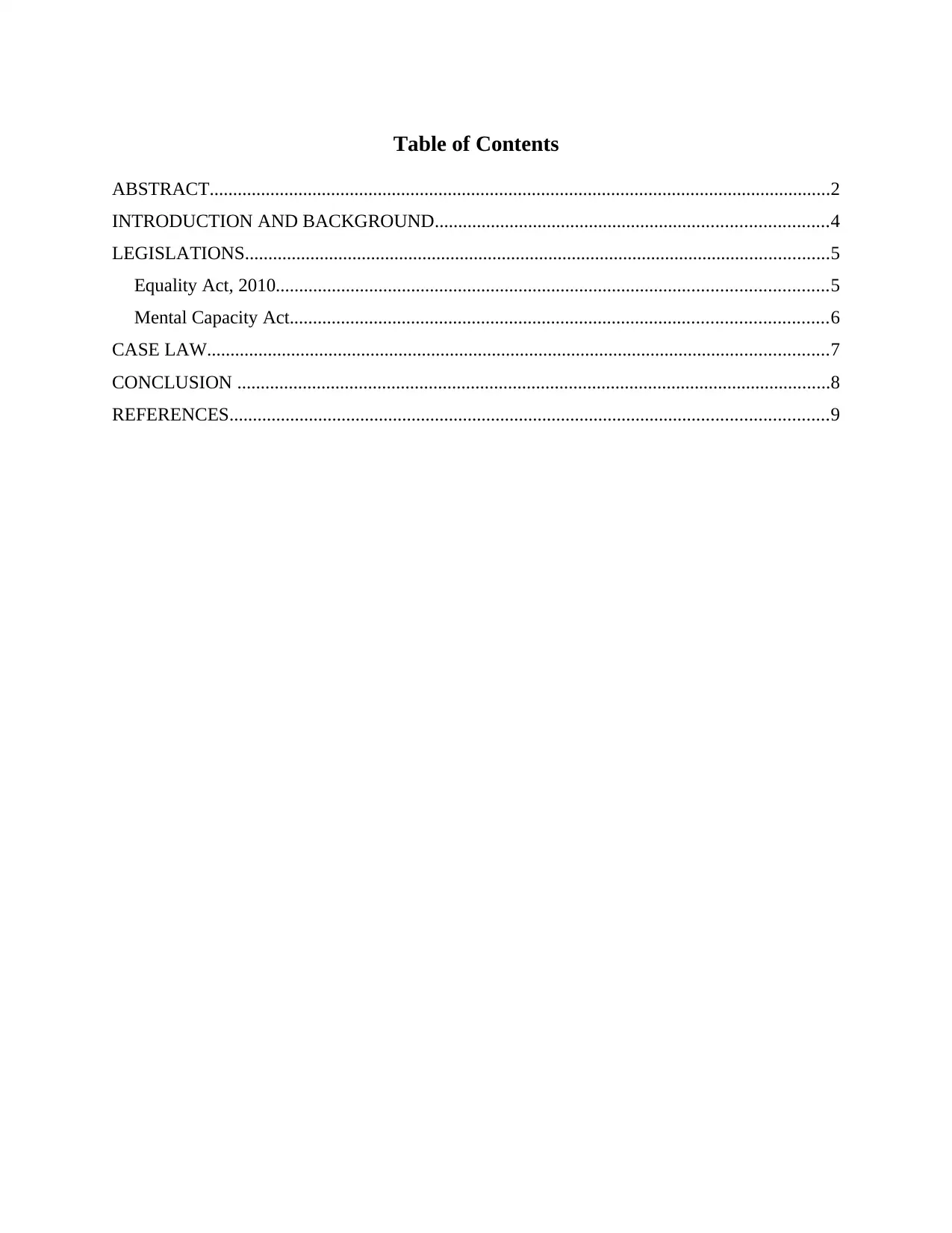
Table of Contents
ABSTRACT.....................................................................................................................................2
INTRODUCTION AND BACKGROUND....................................................................................4
LEGISLATIONS.............................................................................................................................5
Equality Act, 2010......................................................................................................................5
Mental Capacity Act...................................................................................................................6
CASE LAW.....................................................................................................................................7
CONCLUSION ...............................................................................................................................8
REFERENCES................................................................................................................................9
ABSTRACT.....................................................................................................................................2
INTRODUCTION AND BACKGROUND....................................................................................4
LEGISLATIONS.............................................................................................................................5
Equality Act, 2010......................................................................................................................5
Mental Capacity Act...................................................................................................................6
CASE LAW.....................................................................................................................................7
CONCLUSION ...............................................................................................................................8
REFERENCES................................................................................................................................9
⊘ This is a preview!⊘
Do you want full access?
Subscribe today to unlock all pages.

Trusted by 1+ million students worldwide
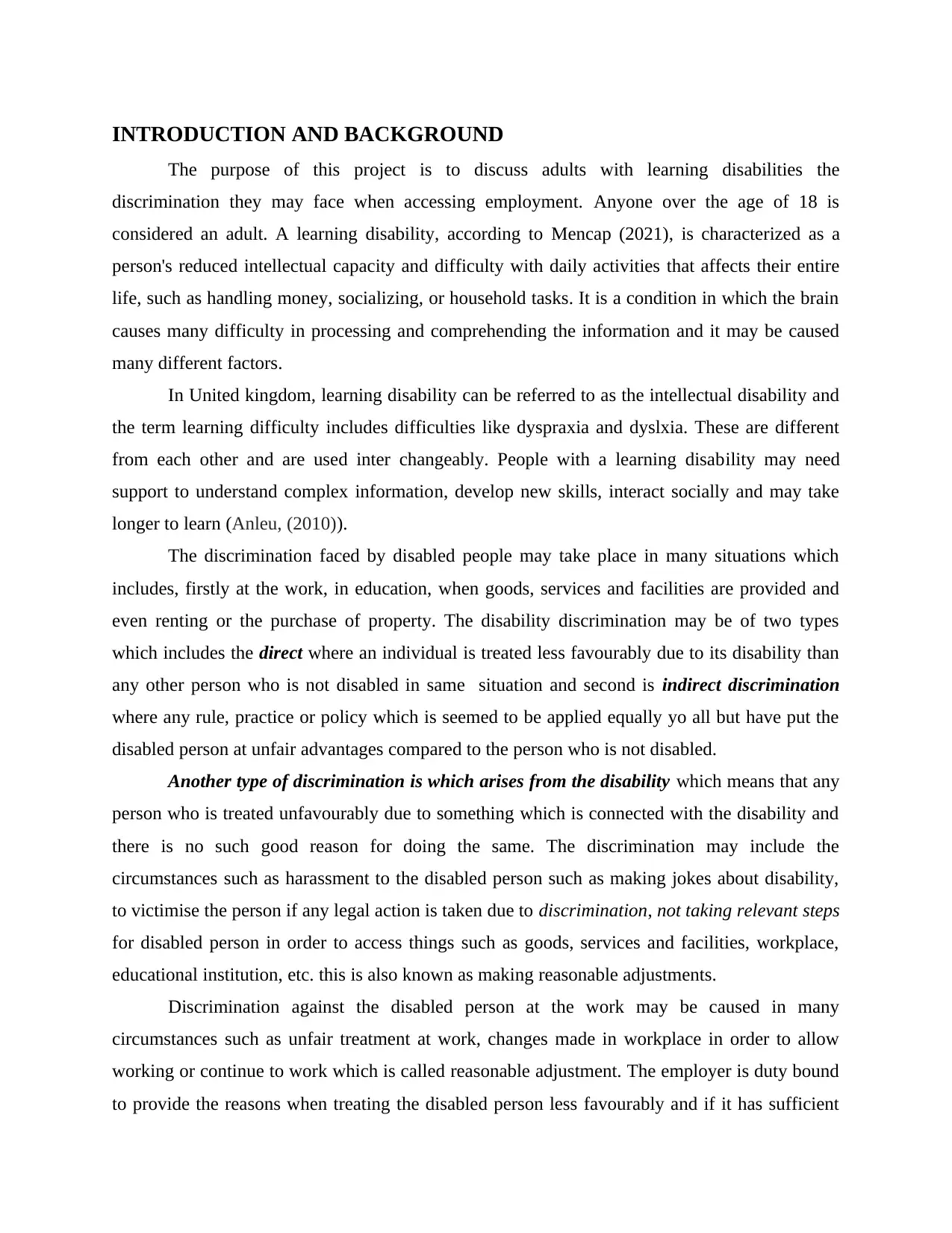
INTRODUCTION AND BACKGROUND
The purpose of this project is to discuss adults with learning disabilities the
discrimination they may face when accessing employment. Anyone over the age of 18 is
considered an adult. A learning disability, according to Mencap (2021), is characterized as a
person's reduced intellectual capacity and difficulty with daily activities that affects their entire
life, such as handling money, socializing, or household tasks. It is a condition in which the brain
causes many difficulty in processing and comprehending the information and it may be caused
many different factors.
In United kingdom, learning disability can be referred to as the intellectual disability and
the term learning difficulty includes difficulties like dyspraxia and dyslxia. These are different
from each other and are used inter changeably. People with a learning disability may need
support to understand complex information, develop new skills, interact socially and may take
longer to learn (Anleu, (2010)).
The discrimination faced by disabled people may take place in many situations which
includes, firstly at the work, in education, when goods, services and facilities are provided and
even renting or the purchase of property. The disability discrimination may be of two types
which includes the direct where an individual is treated less favourably due to its disability than
any other person who is not disabled in same situation and second is indirect discrimination
where any rule, practice or policy which is seemed to be applied equally yo all but have put the
disabled person at unfair advantages compared to the person who is not disabled.
Another type of discrimination is which arises from the disability which means that any
person who is treated unfavourably due to something which is connected with the disability and
there is no such good reason for doing the same. The discrimination may include the
circumstances such as harassment to the disabled person such as making jokes about disability,
to victimise the person if any legal action is taken due to discrimination, not taking relevant steps
for disabled person in order to access things such as goods, services and facilities, workplace,
educational institution, etc. this is also known as making reasonable adjustments.
Discrimination against the disabled person at the work may be caused in many
circumstances such as unfair treatment at work, changes made in workplace in order to allow
working or continue to work which is called reasonable adjustment. The employer is duty bound
to provide the reasons when treating the disabled person less favourably and if it has sufficient
The purpose of this project is to discuss adults with learning disabilities the
discrimination they may face when accessing employment. Anyone over the age of 18 is
considered an adult. A learning disability, according to Mencap (2021), is characterized as a
person's reduced intellectual capacity and difficulty with daily activities that affects their entire
life, such as handling money, socializing, or household tasks. It is a condition in which the brain
causes many difficulty in processing and comprehending the information and it may be caused
many different factors.
In United kingdom, learning disability can be referred to as the intellectual disability and
the term learning difficulty includes difficulties like dyspraxia and dyslxia. These are different
from each other and are used inter changeably. People with a learning disability may need
support to understand complex information, develop new skills, interact socially and may take
longer to learn (Anleu, (2010)).
The discrimination faced by disabled people may take place in many situations which
includes, firstly at the work, in education, when goods, services and facilities are provided and
even renting or the purchase of property. The disability discrimination may be of two types
which includes the direct where an individual is treated less favourably due to its disability than
any other person who is not disabled in same situation and second is indirect discrimination
where any rule, practice or policy which is seemed to be applied equally yo all but have put the
disabled person at unfair advantages compared to the person who is not disabled.
Another type of discrimination is which arises from the disability which means that any
person who is treated unfavourably due to something which is connected with the disability and
there is no such good reason for doing the same. The discrimination may include the
circumstances such as harassment to the disabled person such as making jokes about disability,
to victimise the person if any legal action is taken due to discrimination, not taking relevant steps
for disabled person in order to access things such as goods, services and facilities, workplace,
educational institution, etc. this is also known as making reasonable adjustments.
Discrimination against the disabled person at the work may be caused in many
circumstances such as unfair treatment at work, changes made in workplace in order to allow
working or continue to work which is called reasonable adjustment. The employer is duty bound
to provide the reasons when treating the disabled person less favourably and if it has sufficient
Paraphrase This Document
Need a fresh take? Get an instant paraphrase of this document with our AI Paraphraser
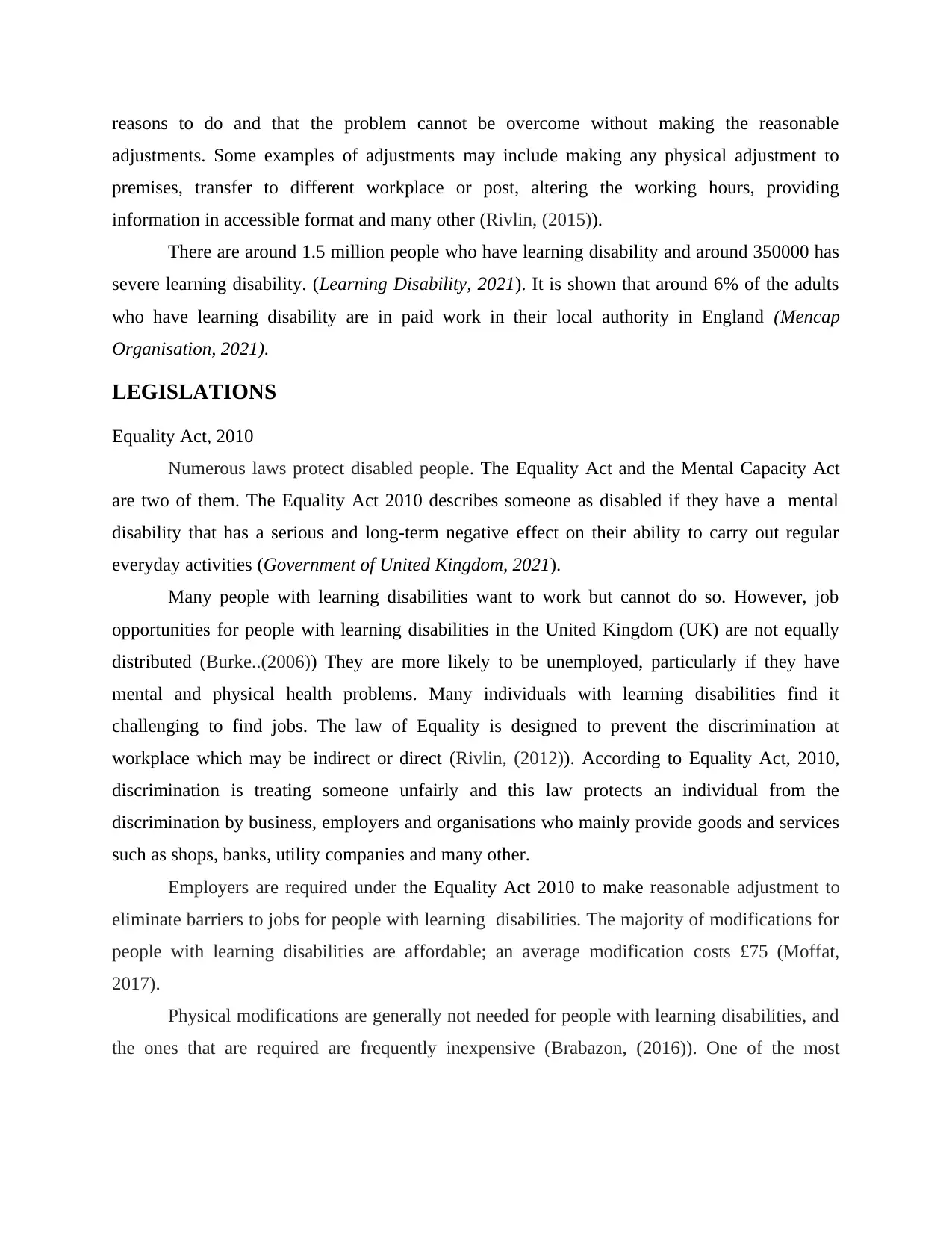
reasons to do and that the problem cannot be overcome without making the reasonable
adjustments. Some examples of adjustments may include making any physical adjustment to
premises, transfer to different workplace or post, altering the working hours, providing
information in accessible format and many other (Rivlin, (2015)).
There are around 1.5 million people who have learning disability and around 350000 has
severe learning disability. (Learning Disability, 2021). It is shown that around 6% of the adults
who have learning disability are in paid work in their local authority in England (Mencap
Organisation, 2021).
LEGISLATIONS
Equality Act, 2010
Numerous laws protect disabled people. The Equality Act and the Mental Capacity Act
are two of them. The Equality Act 2010 describes someone as disabled if they have a mental
disability that has a serious and long-term negative effect on their ability to carry out regular
everyday activities (Government of United Kingdom, 2021).
Many people with learning disabilities want to work but cannot do so. However, job
opportunities for people with learning disabilities in the United Kingdom (UK) are not equally
distributed (Burke..(2006)) They are more likely to be unemployed, particularly if they have
mental and physical health problems. Many individuals with learning disabilities find it
challenging to find jobs. The law of Equality is designed to prevent the discrimination at
workplace which may be indirect or direct (Rivlin, (2012)). According to Equality Act, 2010,
discrimination is treating someone unfairly and this law protects an individual from the
discrimination by business, employers and organisations who mainly provide goods and services
such as shops, banks, utility companies and many other.
Employers are required under the Equality Act 2010 to make reasonable adjustment to
eliminate barriers to jobs for people with learning disabilities. The majority of modifications for
people with learning disabilities are affordable; an average modification costs £75 (Moffat,
2017).
Physical modifications are generally not needed for people with learning disabilities, and
the ones that are required are frequently inexpensive (Brabazon, (2016)). One of the most
adjustments. Some examples of adjustments may include making any physical adjustment to
premises, transfer to different workplace or post, altering the working hours, providing
information in accessible format and many other (Rivlin, (2015)).
There are around 1.5 million people who have learning disability and around 350000 has
severe learning disability. (Learning Disability, 2021). It is shown that around 6% of the adults
who have learning disability are in paid work in their local authority in England (Mencap
Organisation, 2021).
LEGISLATIONS
Equality Act, 2010
Numerous laws protect disabled people. The Equality Act and the Mental Capacity Act
are two of them. The Equality Act 2010 describes someone as disabled if they have a mental
disability that has a serious and long-term negative effect on their ability to carry out regular
everyday activities (Government of United Kingdom, 2021).
Many people with learning disabilities want to work but cannot do so. However, job
opportunities for people with learning disabilities in the United Kingdom (UK) are not equally
distributed (Burke..(2006)) They are more likely to be unemployed, particularly if they have
mental and physical health problems. Many individuals with learning disabilities find it
challenging to find jobs. The law of Equality is designed to prevent the discrimination at
workplace which may be indirect or direct (Rivlin, (2012)). According to Equality Act, 2010,
discrimination is treating someone unfairly and this law protects an individual from the
discrimination by business, employers and organisations who mainly provide goods and services
such as shops, banks, utility companies and many other.
Employers are required under the Equality Act 2010 to make reasonable adjustment to
eliminate barriers to jobs for people with learning disabilities. The majority of modifications for
people with learning disabilities are affordable; an average modification costs £75 (Moffat,
2017).
Physical modifications are generally not needed for people with learning disabilities, and
the ones that are required are frequently inexpensive (Brabazon, (2016)). One of the most
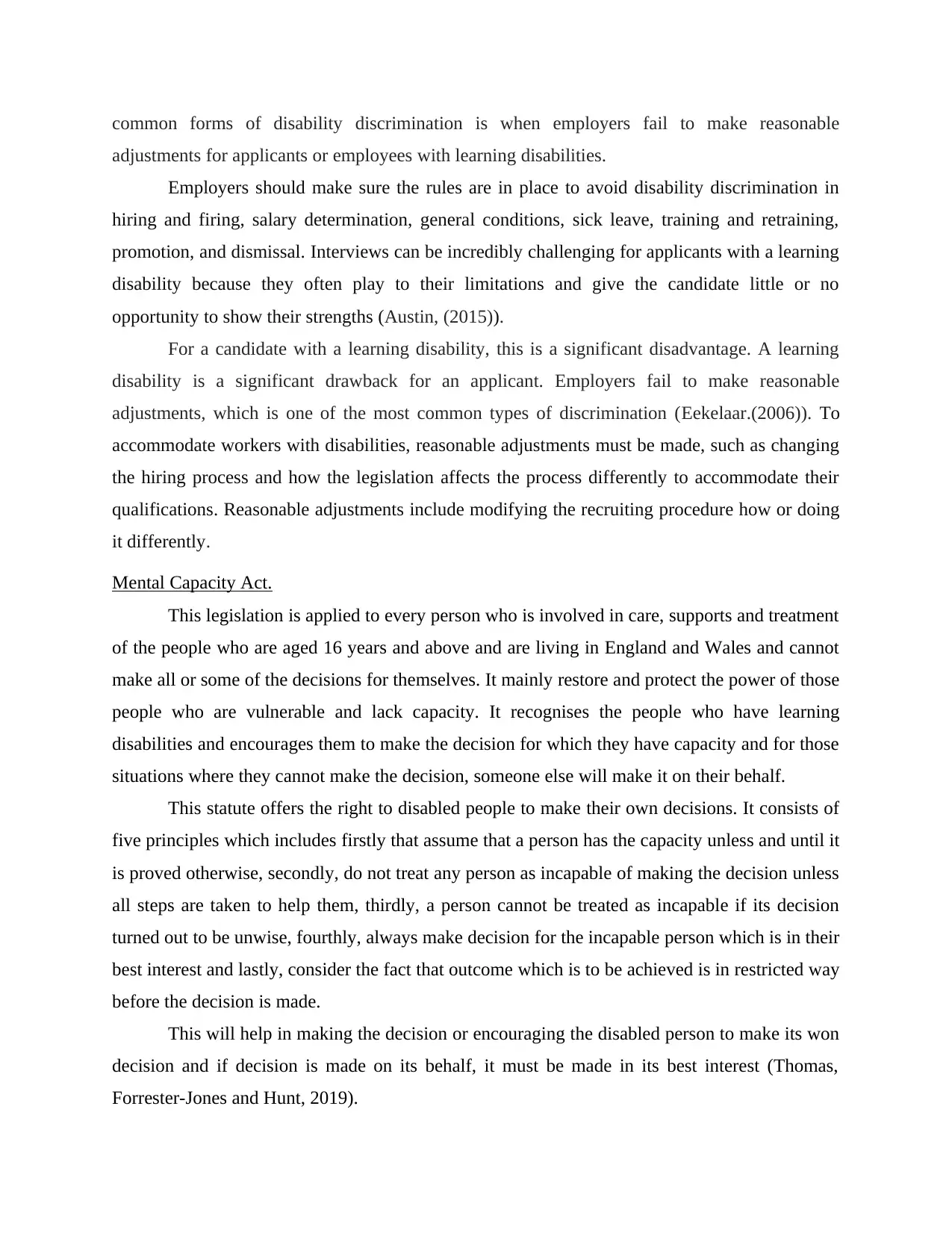
common forms of disability discrimination is when employers fail to make reasonable
adjustments for applicants or employees with learning disabilities.
Employers should make sure the rules are in place to avoid disability discrimination in
hiring and firing, salary determination, general conditions, sick leave, training and retraining,
promotion, and dismissal. Interviews can be incredibly challenging for applicants with a learning
disability because they often play to their limitations and give the candidate little or no
opportunity to show their strengths (Austin, (2015)).
For a candidate with a learning disability, this is a significant disadvantage. A learning
disability is a significant drawback for an applicant. Employers fail to make reasonable
adjustments, which is one of the most common types of discrimination (Eekelaar.(2006)). To
accommodate workers with disabilities, reasonable adjustments must be made, such as changing
the hiring process and how the legislation affects the process differently to accommodate their
qualifications. Reasonable adjustments include modifying the recruiting procedure how or doing
it differently.
Mental Capacity Act.
This legislation is applied to every person who is involved in care, supports and treatment
of the people who are aged 16 years and above and are living in England and Wales and cannot
make all or some of the decisions for themselves. It mainly restore and protect the power of those
people who are vulnerable and lack capacity. It recognises the people who have learning
disabilities and encourages them to make the decision for which they have capacity and for those
situations where they cannot make the decision, someone else will make it on their behalf.
This statute offers the right to disabled people to make their own decisions. It consists of
five principles which includes firstly that assume that a person has the capacity unless and until it
is proved otherwise, secondly, do not treat any person as incapable of making the decision unless
all steps are taken to help them, thirdly, a person cannot be treated as incapable if its decision
turned out to be unwise, fourthly, always make decision for the incapable person which is in their
best interest and lastly, consider the fact that outcome which is to be achieved is in restricted way
before the decision is made.
This will help in making the decision or encouraging the disabled person to make its won
decision and if decision is made on its behalf, it must be made in its best interest (Thomas,
Forrester-Jones and Hunt, 2019).
adjustments for applicants or employees with learning disabilities.
Employers should make sure the rules are in place to avoid disability discrimination in
hiring and firing, salary determination, general conditions, sick leave, training and retraining,
promotion, and dismissal. Interviews can be incredibly challenging for applicants with a learning
disability because they often play to their limitations and give the candidate little or no
opportunity to show their strengths (Austin, (2015)).
For a candidate with a learning disability, this is a significant disadvantage. A learning
disability is a significant drawback for an applicant. Employers fail to make reasonable
adjustments, which is one of the most common types of discrimination (Eekelaar.(2006)). To
accommodate workers with disabilities, reasonable adjustments must be made, such as changing
the hiring process and how the legislation affects the process differently to accommodate their
qualifications. Reasonable adjustments include modifying the recruiting procedure how or doing
it differently.
Mental Capacity Act.
This legislation is applied to every person who is involved in care, supports and treatment
of the people who are aged 16 years and above and are living in England and Wales and cannot
make all or some of the decisions for themselves. It mainly restore and protect the power of those
people who are vulnerable and lack capacity. It recognises the people who have learning
disabilities and encourages them to make the decision for which they have capacity and for those
situations where they cannot make the decision, someone else will make it on their behalf.
This statute offers the right to disabled people to make their own decisions. It consists of
five principles which includes firstly that assume that a person has the capacity unless and until it
is proved otherwise, secondly, do not treat any person as incapable of making the decision unless
all steps are taken to help them, thirdly, a person cannot be treated as incapable if its decision
turned out to be unwise, fourthly, always make decision for the incapable person which is in their
best interest and lastly, consider the fact that outcome which is to be achieved is in restricted way
before the decision is made.
This will help in making the decision or encouraging the disabled person to make its won
decision and if decision is made on its behalf, it must be made in its best interest (Thomas,
Forrester-Jones and Hunt, 2019).
⊘ This is a preview!⊘
Do you want full access?
Subscribe today to unlock all pages.

Trusted by 1+ million students worldwide
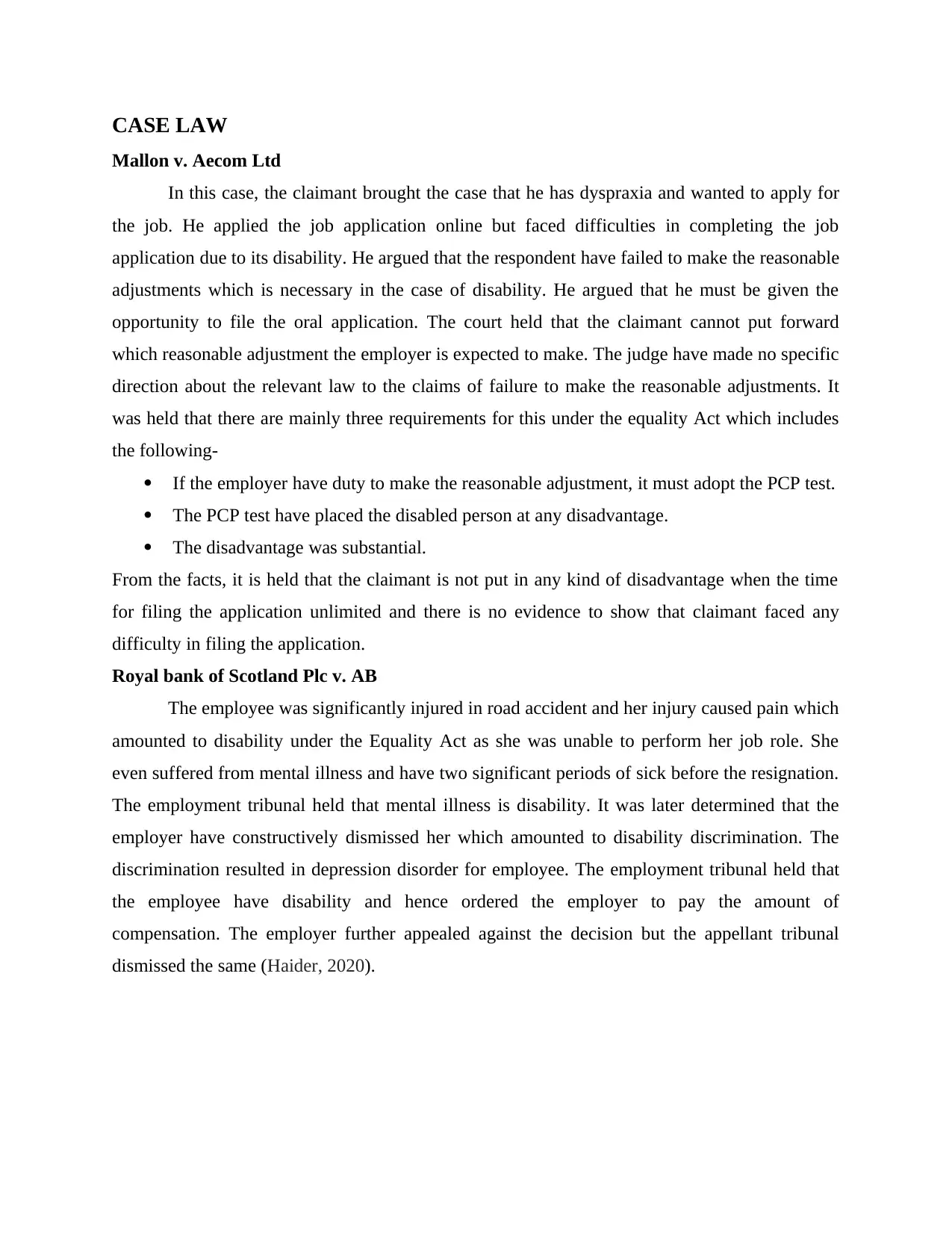
CASE LAW
Mallon v. Aecom Ltd
In this case, the claimant brought the case that he has dyspraxia and wanted to apply for
the job. He applied the job application online but faced difficulties in completing the job
application due to its disability. He argued that the respondent have failed to make the reasonable
adjustments which is necessary in the case of disability. He argued that he must be given the
opportunity to file the oral application. The court held that the claimant cannot put forward
which reasonable adjustment the employer is expected to make. The judge have made no specific
direction about the relevant law to the claims of failure to make the reasonable adjustments. It
was held that there are mainly three requirements for this under the equality Act which includes
the following-
If the employer have duty to make the reasonable adjustment, it must adopt the PCP test.
The PCP test have placed the disabled person at any disadvantage.
The disadvantage was substantial.
From the facts, it is held that the claimant is not put in any kind of disadvantage when the time
for filing the application unlimited and there is no evidence to show that claimant faced any
difficulty in filing the application.
Royal bank of Scotland Plc v. AB
The employee was significantly injured in road accident and her injury caused pain which
amounted to disability under the Equality Act as she was unable to perform her job role. She
even suffered from mental illness and have two significant periods of sick before the resignation.
The employment tribunal held that mental illness is disability. It was later determined that the
employer have constructively dismissed her which amounted to disability discrimination. The
discrimination resulted in depression disorder for employee. The employment tribunal held that
the employee have disability and hence ordered the employer to pay the amount of
compensation. The employer further appealed against the decision but the appellant tribunal
dismissed the same (Haider, 2020).
Mallon v. Aecom Ltd
In this case, the claimant brought the case that he has dyspraxia and wanted to apply for
the job. He applied the job application online but faced difficulties in completing the job
application due to its disability. He argued that the respondent have failed to make the reasonable
adjustments which is necessary in the case of disability. He argued that he must be given the
opportunity to file the oral application. The court held that the claimant cannot put forward
which reasonable adjustment the employer is expected to make. The judge have made no specific
direction about the relevant law to the claims of failure to make the reasonable adjustments. It
was held that there are mainly three requirements for this under the equality Act which includes
the following-
If the employer have duty to make the reasonable adjustment, it must adopt the PCP test.
The PCP test have placed the disabled person at any disadvantage.
The disadvantage was substantial.
From the facts, it is held that the claimant is not put in any kind of disadvantage when the time
for filing the application unlimited and there is no evidence to show that claimant faced any
difficulty in filing the application.
Royal bank of Scotland Plc v. AB
The employee was significantly injured in road accident and her injury caused pain which
amounted to disability under the Equality Act as she was unable to perform her job role. She
even suffered from mental illness and have two significant periods of sick before the resignation.
The employment tribunal held that mental illness is disability. It was later determined that the
employer have constructively dismissed her which amounted to disability discrimination. The
discrimination resulted in depression disorder for employee. The employment tribunal held that
the employee have disability and hence ordered the employer to pay the amount of
compensation. The employer further appealed against the decision but the appellant tribunal
dismissed the same (Haider, 2020).
Paraphrase This Document
Need a fresh take? Get an instant paraphrase of this document with our AI Paraphraser
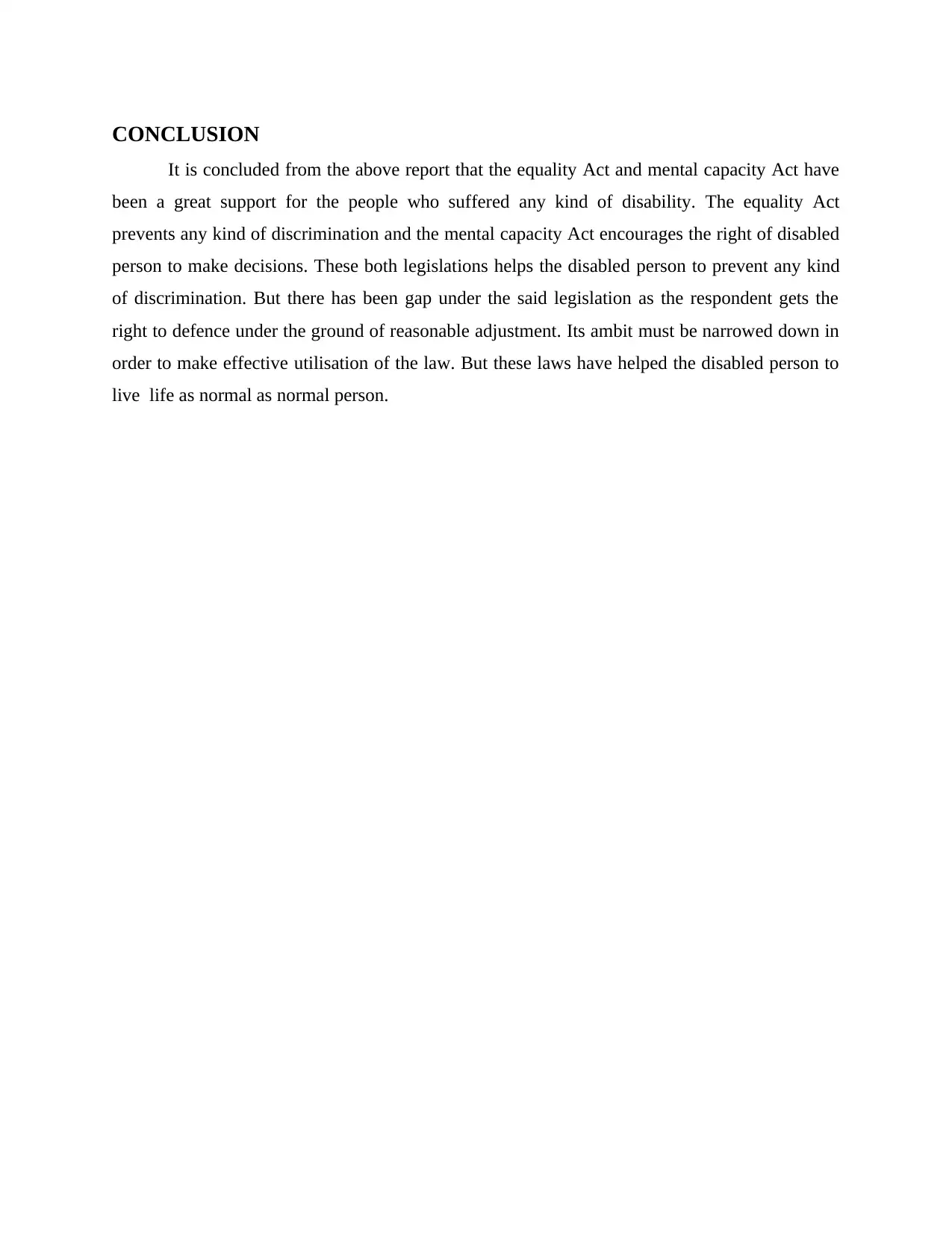
CONCLUSION
It is concluded from the above report that the equality Act and mental capacity Act have
been a great support for the people who suffered any kind of disability. The equality Act
prevents any kind of discrimination and the mental capacity Act encourages the right of disabled
person to make decisions. These both legislations helps the disabled person to prevent any kind
of discrimination. But there has been gap under the said legislation as the respondent gets the
right to defence under the ground of reasonable adjustment. Its ambit must be narrowed down in
order to make effective utilisation of the law. But these laws have helped the disabled person to
live life as normal as normal person.
It is concluded from the above report that the equality Act and mental capacity Act have
been a great support for the people who suffered any kind of disability. The equality Act
prevents any kind of discrimination and the mental capacity Act encourages the right of disabled
person to make decisions. These both legislations helps the disabled person to prevent any kind
of discrimination. But there has been gap under the said legislation as the respondent gets the
right to defence under the ground of reasonable adjustment. Its ambit must be narrowed down in
order to make effective utilisation of the law. But these laws have helped the disabled person to
live life as normal as normal person.
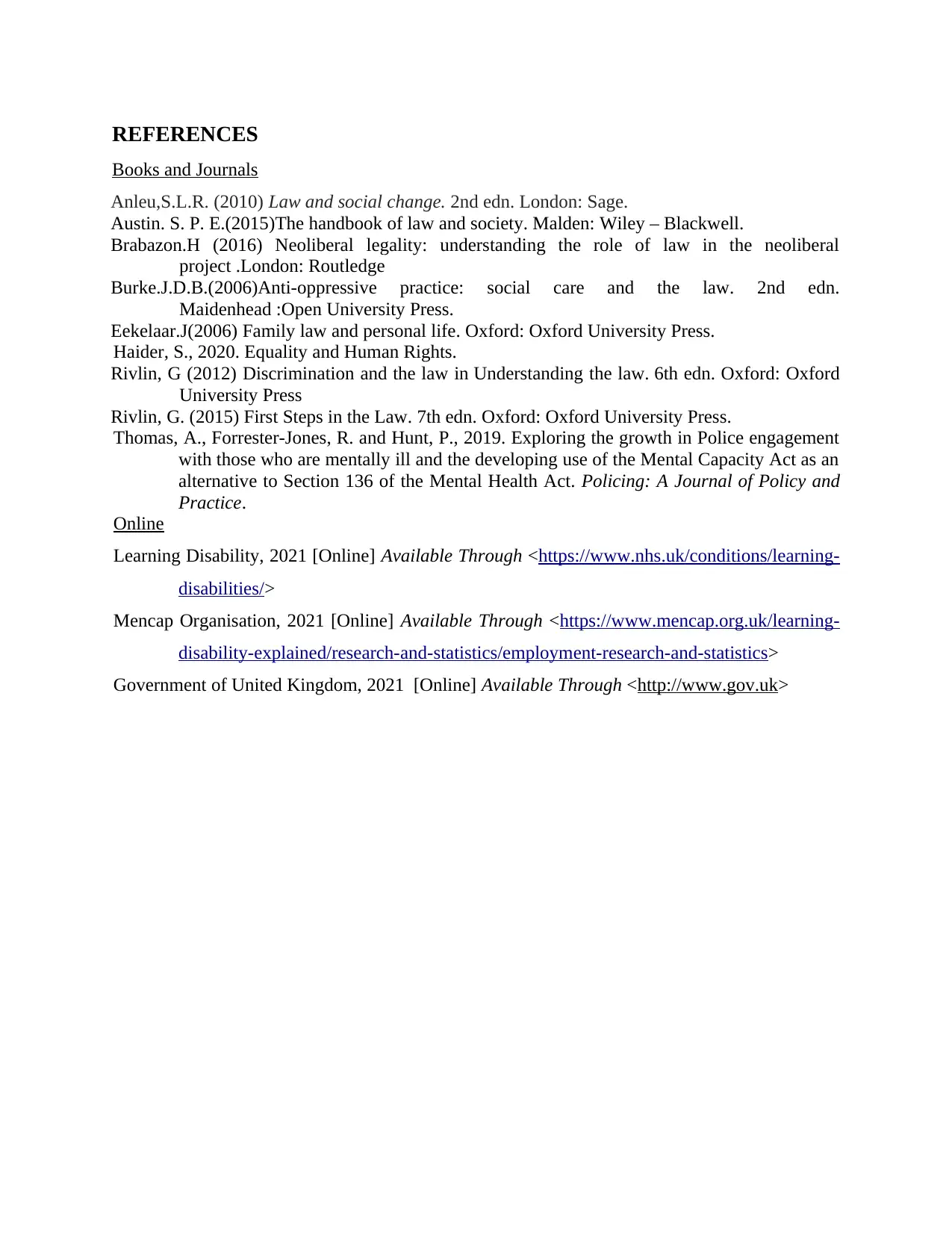
REFERENCES
Books and Journals
Anleu,S.L.R. (2010) Law and social change. 2nd edn. London: Sage.
Austin. S. P. E.(2015)The handbook of law and society. Malden: Wiley – Blackwell.
Brabazon.H (2016) Neoliberal legality: understanding the role of law in the neoliberal
project .London: Routledge
Burke.J.D.B.(2006)Anti-oppressive practice: social care and the law. 2nd edn.
Maidenhead :Open University Press.
Eekelaar.J(2006) Family law and personal life. Oxford: Oxford University Press.
Haider, S., 2020. Equality and Human Rights.
Rivlin, G (2012) Discrimination and the law in Understanding the law. 6th edn. Oxford: Oxford
University Press
Rivlin, G. (2015) First Steps in the Law. 7th edn. Oxford: Oxford University Press.
Thomas, A., Forrester-Jones, R. and Hunt, P., 2019. Exploring the growth in Police engagement
with those who are mentally ill and the developing use of the Mental Capacity Act as an
alternative to Section 136 of the Mental Health Act. Policing: A Journal of Policy and
Practice.
Online
Learning Disability, 2021 [Online] Available Through <https://www.nhs.uk/conditions/learning-
disabilities/>
Mencap Organisation, 2021 [Online] Available Through <https://www.mencap.org.uk/learning-
disability-explained/research-and-statistics/employment-research-and-statistics>
Government of United Kingdom, 2021 [Online] Available Through <http://www.gov.uk>
Books and Journals
Anleu,S.L.R. (2010) Law and social change. 2nd edn. London: Sage.
Austin. S. P. E.(2015)The handbook of law and society. Malden: Wiley – Blackwell.
Brabazon.H (2016) Neoliberal legality: understanding the role of law in the neoliberal
project .London: Routledge
Burke.J.D.B.(2006)Anti-oppressive practice: social care and the law. 2nd edn.
Maidenhead :Open University Press.
Eekelaar.J(2006) Family law and personal life. Oxford: Oxford University Press.
Haider, S., 2020. Equality and Human Rights.
Rivlin, G (2012) Discrimination and the law in Understanding the law. 6th edn. Oxford: Oxford
University Press
Rivlin, G. (2015) First Steps in the Law. 7th edn. Oxford: Oxford University Press.
Thomas, A., Forrester-Jones, R. and Hunt, P., 2019. Exploring the growth in Police engagement
with those who are mentally ill and the developing use of the Mental Capacity Act as an
alternative to Section 136 of the Mental Health Act. Policing: A Journal of Policy and
Practice.
Online
Learning Disability, 2021 [Online] Available Through <https://www.nhs.uk/conditions/learning-
disabilities/>
Mencap Organisation, 2021 [Online] Available Through <https://www.mencap.org.uk/learning-
disability-explained/research-and-statistics/employment-research-and-statistics>
Government of United Kingdom, 2021 [Online] Available Through <http://www.gov.uk>
⊘ This is a preview!⊘
Do you want full access?
Subscribe today to unlock all pages.

Trusted by 1+ million students worldwide
1 out of 9
Related Documents
Your All-in-One AI-Powered Toolkit for Academic Success.
+13062052269
info@desklib.com
Available 24*7 on WhatsApp / Email
![[object Object]](/_next/static/media/star-bottom.7253800d.svg)
Unlock your academic potential
Copyright © 2020–2025 A2Z Services. All Rights Reserved. Developed and managed by ZUCOL.





